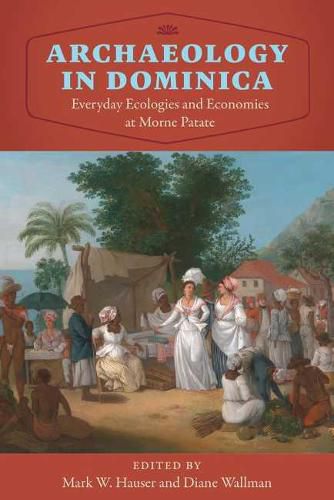Readings Newsletter
Become a Readings Member to make your shopping experience even easier.
Sign in or sign up for free!
You’re not far away from qualifying for FREE standard shipping within Australia
You’ve qualified for FREE standard shipping within Australia
The cart is loading…






This title is printed to order. This book may have been self-published. If so, we cannot guarantee the quality of the content. In the main most books will have gone through the editing process however some may not. We therefore suggest that you be aware of this before ordering this book. If in doubt check either the author or publisher’s details as we are unable to accept any returns unless they are faulty. Please contact us if you have any questions.
Archaeology in Dominica examines the everyday lives of enslaved and free workers at Morne Patate, an eighteenth- and nineteenth-century Caribbean plantation that produced sugar, coffee, and provisions. Focusing on household archaeology, this volume helps document the underrepresented history of slavery and colonialism on the edge of the British Empire.
Contributors discuss how enslaved and free people were entangled in shifting economic and ecological systems during the plantation’s 200-year history, most notably the introduction of sugarcane as an export commodity. Analyzing historical records, the landscape geography of the plantation, and material remains from the residences of laborers, the authors synthesize extensive data from this site and compare it to that of other excavations across the Eastern Caribbean. Using historical archaeology to investigate the political ecology of Morne Patate opens up a deeper understanding of the environmental legacies of colonial empires, as well as the long-term impacts of plantation agriculture on the Caribbean region and its people.
A volume in the Florida Museum of Natural History: Ripley P. Bullen Series.
$9.00 standard shipping within Australia
FREE standard shipping within Australia for orders over $100.00
Express & International shipping calculated at checkout
This title is printed to order. This book may have been self-published. If so, we cannot guarantee the quality of the content. In the main most books will have gone through the editing process however some may not. We therefore suggest that you be aware of this before ordering this book. If in doubt check either the author or publisher’s details as we are unable to accept any returns unless they are faulty. Please contact us if you have any questions.
Archaeology in Dominica examines the everyday lives of enslaved and free workers at Morne Patate, an eighteenth- and nineteenth-century Caribbean plantation that produced sugar, coffee, and provisions. Focusing on household archaeology, this volume helps document the underrepresented history of slavery and colonialism on the edge of the British Empire.
Contributors discuss how enslaved and free people were entangled in shifting economic and ecological systems during the plantation’s 200-year history, most notably the introduction of sugarcane as an export commodity. Analyzing historical records, the landscape geography of the plantation, and material remains from the residences of laborers, the authors synthesize extensive data from this site and compare it to that of other excavations across the Eastern Caribbean. Using historical archaeology to investigate the political ecology of Morne Patate opens up a deeper understanding of the environmental legacies of colonial empires, as well as the long-term impacts of plantation agriculture on the Caribbean region and its people.
A volume in the Florida Museum of Natural History: Ripley P. Bullen Series.